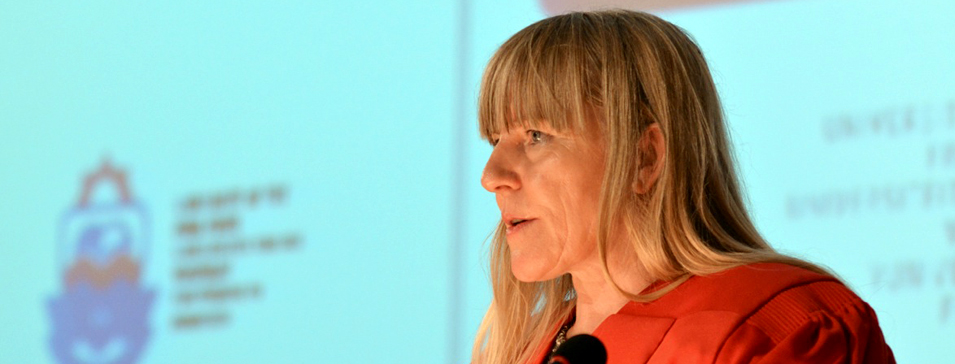Latest News Archive
Please select Category, Year, and then Month to display items
19 November 2018
|
Story Charlene Stanley
|
Photo Charlene Stanley
 Prof John Mubangizi, Dean of the Faculty of Law, encouraged delegates at the Fifth Annual International Mercantile Conference to share ideas on best international practice in their various fields.
Prof John Mubangizi, Dean of the Faculty of Law, encouraged delegates at the Fifth Annual International Mercantile Conference to share ideas on best international practice in their various fields.
“Don’t say anything online that you wouldn’t want plastered on a billboard with your face on it.”
This famous quote by international tech expert Erin Bury should be a guiding light when it comes to online habits in the workplace, according to Francois Cilliers, UFS Lecturer in Mercantile Law.
In his presentation Could Social Media be the Gateway to Employment Discrimination? he warned that employees have a responsibility not to bring their employers in disrepute through their comments on social media.
“Posts, updates, tweets, and comments are considered to be publications and can therefore never be seen as privileged information,” he explained.
Responsibility on employees and employers alike
He pointed out that employers also had a responsibility regarding the way in which they use the information about prospective employees obtained via social media.
“Nowadays, approximately 75% of companies hire through social media. In the US, recruiting companies spend hours researching candidates, making full use of what they can find on social media. It was found that 50–80% of employers frowned upon posts and pictures featuring drug and alcohol abuse, profanity, and bad grammar.”
He warned that employers needed to tread lightly, as a decision not to employ someone as a result of information on the prospective employee’s political views and sexual orientation could constitute unfair discrimination as set out in the Employment Equity Act.
“An employer who wishes to use a screening process (utilising social media) has to prove that the information and the process is objectively necessary and can be justified with reference to the inherent requirements of the job,” he explained.
“As technology and electronic systems advance, so too should the applicable labour laws.”
Cilliers’ presentation formed part of the Fifth Annual International Mercantile Law Conference recently hosted by the Faculty of Law on the Bloemfontein Campus.
Incorporating new technology in teaching and research
“This conference is an opportunity to share ideas on best practice in what is perceived as a ‘difficult’ field within Law,” said Prof John Mubangizi, Dean of the Faculty of Law, as he opened the proceedings. Topics in the discussion sessions ranged from Racism in the workplace and The underrepresentation of females in the judiciary, to Decriminalisation of cannabis: A recipe for healthy employer-employee relations?
“Conferences such as these help us to take advantage of the newest developments in technology to advance our teaching and research,” said Prof Mubangizi.
“To quote Einstein: ‘We can’t solve problems by using the same kind of thinking we used when we created them.’”
Prof Annie van den Oever envisions the future of film and visual media in her inaugural lecture
2014-02-07

The university formally welcomed Prof Annie van den Oever, an internationally-recognised film and media scholar, within its academic ranks. Her association with the UFS forms part of an exciting new postgraduate programme in film and visual media being created by the Faculty of the Humanities.
Prof Annie van den Oever delivered her inaugural lecture, “Foundational Questions for a Film and Visual Media Programme”, sharing her extensive knowledge in the field. The lecture attracted an international audience with people following the talk via live streaming from places such as Oslo, Berlin and London.
“Annie is quite a connected person through the film and visual media world,” Prof Lucius Botes, Dean of the Faculty of the Humanities, told the audience in the CR Swart Auditorium. He also referred to the fact that, under the auspices of Prof Van den Oever, two staff members from the faculty completed their master’s degrees at the University Groningen where she also teaches. “I am happy to announce that through Annie’s network we can invest in these young people.”
Prof Suzanne Human, Head of the Department History of Art, applauded the senior leadership for its vision to appoint Prof Van den Oever as extraordinary professor. “We have profoundly benefited and will still benefit from Annie’s obvious enjoyment in sharing her considerable experience and expertise in the design of a programme of film and media studies.”
The new postgraduate programme in film and visual media is being developed in partnership with the departments of Art History and Visual Culture Studies, Drama and Theatre Arts, English and the Department of Afrikaans, Dutch, German and French. The university aims to have the first film students enrol in 2015.